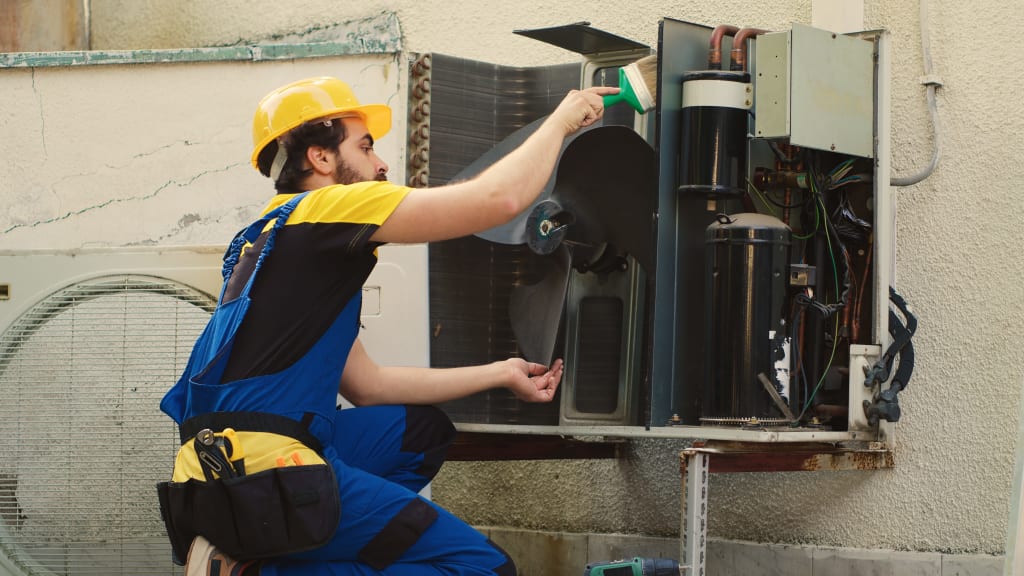Efficiency, safety, and long-term performance are all dependent on the contractor you choose for your heating, ventilation, and air conditioning (HVAC) system. Along with assisting you in reducing your energy expenses, a trustworthy HVAC contractor guarantees excellent installation, upkeep, and repair. The important things to look for when choosing an HVAC contractor will be explained in this article.
How to Find a Reliable HVAC Contractor:
It takes investigation and careful consideration to find a reliable HVAC contractor. The following crucial actions will help you make the best decision:
- Check Licensing and Certification: Verify the contractor’s insurance, certification, and licensing with groups such as ACCA (Air Conditioning Contractors of America) or NATE (North American Technician Excellence).
- Read Online Reviews and Testimonials: To determine consumer happiness, look at Yelp, Google Reviews, and Better Business Bureau (BBB) ratings.
- Ask for Recommendations: Ask friends, relatives, or neighbors who have recently utilized HVAC services for recommendations.
- Verify Experience and Expertise: Select a contractor that has a track record of successfully installing and repairing HVAC systems.
- Request References: To verify their dependability, a respectable contractor should offer references from previous customers.
Red Flags to Watch Out For:
When choosing an HVAC provider, keep an eye out for these warning indicators:
| Red Flag | Why It’s a Problem |
| No Proper Licensing | Unlicensed contractors may provide subpar work and void warranties. |
| Unclear Pricing or Hidden Fees | Avoid companies that provide vague estimates or add unexpected charges later. |
| High-Pressure Sales Tactics | Contractors pushing unnecessary upgrades or services may not have your best interest in mind. |
| Lack of Physical Address | A reputable company should have a local office, not just a P.O. box. |
| Limited or No Warranty Offered | Reliable contractors stand by their work with warranties on parts and labor. |
Comparing HVAC Installation Costs:
The size of the house, the kind of system, and labor expenses can all affect HVAC installation prices. A broad pricing comparison is provided here:
| HVAC System Type | Average Cost (Including Installation) |
| Central Air System | $3,500 – $7,500 |
| Ductless Mini-Split | $2,000 – $8,000 |
| Heat Pump | $4,000 – $10,000 |
| Furnace | $2,500 – $6,000 |
| Boiler System | $3,500 – $10,000 |
Pro Tip: To evaluate costs and service options, always obtain three or more estimates from several contractors.
Importance of Energy-Efficient HVAC Systems:
Purchasing an energy-efficient HVAC system can help you cut your carbon footprint and power bills. Check for these features that save energy:
- ENERGY STAR Certification: Systems with this designation adhere to strict energy-saving guidelines.
- High SEER and AFUE Ratings: Your system’s operational efficiency is indicated by its SEER (Seasonal Energy Efficiency Ratio) and AFUE (Annual Fuel Utilization Efficiency) ratings.
- Smart thermostats: These gadgets aid in controlling temperature levels for maximum effectiveness.
- Appropriate System Sizing: An undersized or oversized unit can lower comfort levels and waste energy.
Benefits of HVAC Maintenance Plans:
Efficiency and lifespan are guaranteed by routine maintenance. The following advantages should be included in maintenance plans provided by a trustworthy contractor:
| Maintenance Plan Features | Benefits |
| Biannual Tune-Ups | Keeps your system running efficiently year-round |
| Priority Service | Get faster response times for emergency repairs. |
| Discounted Repairs | Save on parts and labor costs. |
| Extended Equipment Lifespan | Prevents premature system failures. |
| Improved Air Quality | Regular filter changes reduce allergens and dust buildup. |
Questions to Ask Your HVAC Contractor:
Before deciding on a contractor, ask them the following questions:
- Do you have insurance and a license?
- Do you provide free estimates at your house?
- What labor and equipment guarantees do you provide?
- Is it possible to obtain a comprehensive written contract that includes price breakdowns?
- Have you worked with HVAC systems that use less energy?
- What kinds of funding are available?
- What is included in your maintenance plan, if you have one?
Final Thoughts:
For long-term cost savings, energy efficiency, and interior comfort, selecting the appropriate HVAC contractor is crucial. You can make sure you choose a professional who provides high-quality service by doing your homework, comparing quotes, and staying away from warning signs. Choosing a trustworthy provider can give you peace of mind and a pleasant home or workplace, regardless of whether you require HVAC installation, maintenance, or repair.
In need of Las Vegas HVAC services? For certified, experienced, and energy-efficient solutions, get in touch with Go Green Heating & Cooling!


Related Stories
The Cost Breakdown of Installing a Mini Split AC System
Mini split air conditioning systems are changing the way homeowners think about cooling. Whether you
May
Why Regular Chimney Cleaning Could Save Your Home—and Your Wallet
Nothing says comfort like a warm fire on a chilly night—but what’s going on inside
May
Should Ductwork Be Replaced After 20 Years?
When your HVAC system works hard to keep you comfortable, your air ducts play a
May
Why Dryer Vent Cleaning is Essential for Fire Prevention
Dryer vent cleaning isn’t just about keeping your appliance running better—it’s one of the simplest
May